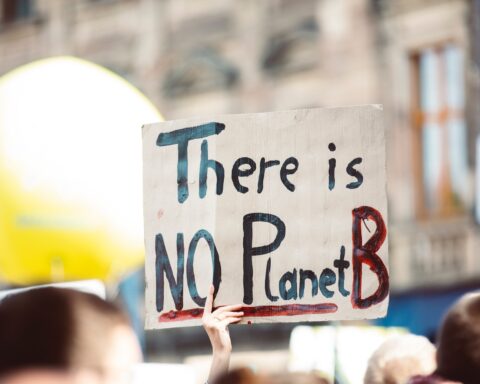
It’s important to listen to the tone of conversations around climate change and fossil fuel divestment because, increasingly, these discussions are taking place in wholly disparate worlds.
On one side, calm and measured voices like MRTI discuss climate change as “a very serious problem,” and speak glowingly of plans for “pressure shareholder resolutions,” and “proxy votes,” as the wise and steady course. Meanwhile, frontline communities discuss climate change quite differently:
- Amina Abdul Hussein, a climate refugee in Somaliland, tells Vice: “I was pregnant before coming here but I had no water, so I lost my baby.”
- Ricardo Saldivar, whose four great-nieces and great-nephews drowned in Hurricane Harvey, describes “the kids screaming and crying, trying to get out of the van.”
- In September, Mayor of San Juan, Puerto Rico Carmen Yulín Cruz put matters bluntly: “We are dying here.”
The juxtaposition between these two conversations confronts the PC(USA) with a stark moral choice: Will we follow those calm voices and stay our present course, or respond to climate refugees’ anguished cries? Our answer reveals the God we worship.
___________________________________________
Will we follow those calm voices and stay our present course, or respond to climate refugees’ anguished cries? Our answer reveals the God we worship.
___________________________________________
MRTI argues that divestment will be ineffective in forcing fossil fuel companies to change, and instead remains optimistic that shareholder advocacy will force them to amend their behavior. Given scant results from years of such negotiations, however, this confidence in companies’ willingness to change feels profoundly misplaced. There’s little reason to believe that an industry that knew about climate change for decades—and, beyond not taking action, actively conspired to deceive the public about its threats—would all of a sudden decide to act in the best interests of people and planet. Yet our denomination continues to hold out hope for a miraculous change in others, when we could instead make a bold moral statement about fossil fuels—and take an important step in ending our own complicity to their evil.

If this framing feels harsh, it’s perhaps because it forces us to confront a truth about our denomination that conversations about divestment frequently avoid: The Presbyterian Church currently profits from people’s death and dislocation. Climate change is no longer an issue that can be discussed in the future tense—it is actively destroying millions of lives, yet the tenor of our debate still often feels as if we were talking about how to avoid a calamity still decades away.
___________________________________________
The Bible is murky about many things, but on this it is emphatically clear: When people are dying, we are called to help.
___________________________________________
Moreover, denominational debate about divestment almost always focuses on the “consequences of divesting”—how it might affect the lives of those who work in the fossil fuel industry, or the internal discord divestment might create amongst more conservative congregations. We rarely, however, consider the moral and human cost of maintaining our fossil fuel investments. This tacit decision betrays the physical and psychological distance that separates most congregations from frontline communities. The brunt of climate change is being felt across the global south and, domestically, among communities of color. As a largely white denomination in the US, it’s not surprising that our membership is presently somewhat removed from its worst effects.
That separation, though a fairly self-evident explanation for resistance to divestment, is no moral justification for ignoring our siblings’ cries. Indeed, the Bible has strong words for those who turn deaf ears to others’ pain because of their own insulation from it. The prophet Amos, upon seeing Israel’s elite ignore the people’s destitution, writes:
“Woe to you who are complacent in Zion, and to you who feel secure on Mount Samaria…You lie on beds adorned with ivory and lounge on your couches…You drink wine by the bowlful and use the finest lotions, but you do not grieve over the ruin of Joseph.” (Amos 6:1;4;6)
Time and again, this refrain rings throughout Scripture. The writer of 1 John queries:
“If anyone has material possessions and sees a brother or sister in need but has no pity on them, how can the love of God be in that person?” (1 John 3:17)
Jesus himself promises damnation for those who disregard suffering, saying:
“Truly I tell you, whatever you did not do for one of the least of these, you did not do for me.” (Matt. 25:45)
The Bible is murky about many things, but on this it is emphatically clear: When people are dying, we are called to help.
Now, there are plenty of smart economic reasons for why divestment is the wisest course of action at this point, in addition to its moral urgency. Solar and wind technology have developed sufficiently that they are fully ready to be deployed as replacements for the energy we create from fossil fuels; anyone who says otherwise is simply not arguing in good faith. Furthermore, the writing is on the wall: At this point, fossil fuels are a bad investment. Detractors of divestment decry the jobs that will be lost in the fossil fuel industry, but ignore the thousands upon thousands of new jobs that positive investment in the renewable sector will create. Finally, we’ve participated in shareholder engagement for years, without garnering any significant victories.
___________________________________________
The fundamental question becomes, “Should the Church maintain active investments in companies that exacerbate and profit from this suffering?” We are not being faithful followers of Jesus if our answer to that question is anything except an emphatic no.
___________________________________________
All of this discussion, however, is really beside the point. Jesus’ words remind us that our first calling as Christians is to stand in solidarity with the marginalized and oppressed. Anything that impedes us from fulfilling this calling, no matter how carefully-argued, is inherently sinful. Discussing whether divestment is “smart” misses the point entirely. When climate change kills thousands around the world—and displaces millions more—the fundamental question becomes, “Should the Church maintain active investments in companies that exacerbate and profit from this suffering?” We are not being faithful followers of Jesus if our answer to that question is anything except an emphatic no.
It’s time to publicly declare what we value more: capital or Christ.
***
Author Bio: Rev. Benjamin Perry is the Assistant Director of Communications and Marketing at Union Theological Seminary and an organizer with the New York Poor People’s Campaign. In addition to Justice Unbound, his writing on the intersection of faith and politics has appeared in outlets such as Slate, Bustle, Huffington Post and Sojourners. You can follow him on Twitter at @FaithfullyBP.






Unbound Social